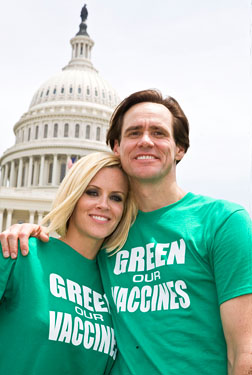Vaccine turn-around hinges on reiteration
 It might not be possible to convince someone who believes that vaccines cause autism that they do not.
It might not be possible to convince someone who believes that vaccines cause autism that they do not.
Telling sceptics that their belief is not scientifically supported often backfires - strengthening, rather than weakening, their anti-vaccine views.
But, researchers now say they have found a way to overcome some of the most entrenched anti-vaccine attitudes; Remind the sceptics, with words and images, why vaccines exist.
The widespread fear of vaccines got its start in 1998, when The Lancet medical journal published a study of 12 children that claimed to link the measles, mumps and rubella vaccine to a later onset of autism.
The study was quickly refuted and eventually retracted, but the idea that vaccines might endanger children's health took hold.
Though outbreaks still occur, most young parents have never seen measles, mumps or rubella in their lifetime, thanks in large part to the efficacy of vaccines.
Many have, however, heard accounts of children with autism whose behavioural difficulties became evident days, weeks or months after their first vaccinations.
Parents who decline to vaccinate their children often focus on the perceived risks of vaccines, says University of Illinois researcher Zachary Horne.
“Perhaps we need to direct people's attention to the other aspect of the decision,” Horne said.
“You may be focused on the risk of getting the shot. But there's also the risk of not getting the shot. You or your child could get measles.”
A previous study attempted to moderate people's anti-vaccination views using a variety of approaches, including challenging anti-vaccine fears and sharing science-based information about the dangers of preventable diseases. All of the approaches failed.
In the new study, the researchers tested 315 participants' views about a number of potentially controversial subjects, including their attitude towards vaccines and their willingness to vaccinate their children.
“We found that directing people's attention to the risks posed by not getting vaccinated, like getting measles, mumps and rubella and the complications associated with those diseases, changed people's attitudes positively towards vaccination - and that was for even the most sceptical participants in the study,” Horne said.
“Actually, the largest effect sizes were for people who were the most sceptical.”
“Of course, the sceptics are the people with the greatest amount of room to move, so in a sense that finding is unsurprising,” Hummel said.
“But it's also extremely important, because those are precisely the people you want to move. That's the kind of result we were really looking for.”
Horne said he thinks the study was successful in part because it addressed parents' primary concern - their children's well-being.
“People who fear vaccines ultimately do care about the safety of their children, so our manipulation focuses on the safety of their children,” he said.
“So there's not just one calculation in your decision whether to get a vaccination, but now there are two.”







 Print
Print